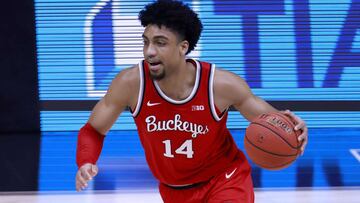March Madness 2021: how much do college players earn?
The NCAA's commitment to the 'principle of amateurism' means college athletes can only receive money towards the cost of their education.


College-basketball rules in the United States prevent the players involved in the National Collegiate Athletic Association (NCAA) Division I Men’s Basketball Tournament, more commonly known as March Madness, from earning any money from the sport.
NCAA committed to 'principle of amateurism'
This is because the NCAA, the governing body of college sport in the US, requires all athletes at higher-education institutions to adhere to its 'principle of amateurism'.
According to the organisation, they should always be students first and athletes second - indeed, it refers to them as ‘student-athletes’. Amateurism, says the NCAA, ensures that gaining an education remains the primary focus of their attendance at university.
"Student-athletes shall be amateurs in an intercollegiate sport, and their participation should be motivated primarily by education and by the physical, mental and social benefits to be derived," the body says in article 2.9 of the 2020/21 NCAA Division I Manual.
Paying college athletes "would distract" from pursuit of education - former NCAA chief
Per Business Insider, the NCAA's former executive vice-president of regulatory affairs, Oliver Luck, said in 2015 that paying college athletes "would distract in a very significant way from pursuing what they really need to pursue - an education... And we need to emphasize the value of that education."
Luck added: "It would be a bad mistake to create campus employer-employee relationships with student-athletes."
Unlike amateur Olympic athletes, college sportsmen and women cannot earn money through endorsements or get paid to sign autographs, either.
Colleges can cover student-athletes' educational costs
One type of compensation that student-athletes can receive from colleges is financial aid aimed at covering educational costs such as tuition, textbooks, accommodation and meals. What’s more, the level of support they are entitled to is growing.
NCAA's amateurism rules lead to lawsuits
Two recent lawsuits brought against the NCAA over its amateurism rules - one by Ed O’Bannon, an ex-UCLA basketball player, and another by a group of collegiate athletes led by former West Virginia football player Shawne Alston - have led to court rulings expanding the amount and scope of aid colleges can provide their athletes.
In a suit filed in 2009, O'Bannon sought to challenge the NCAA's use of the names, images and likenesses of college football and basketball players for commercial purposes, arguing that student-athletes should be compensated for this. Although O'Bannon's case ultimately did not achieve that goal, it did lead to colleges being allowed to offer athletes larger, full-cost-of-attendance scholarships.
On the back of this suit, NCAA v Alston saw federal Judge Claudia Wilken - who had also overseen the O’Bannon case - order schools to be permitted to cover a range of other costs associated with athletes' studies.
"These include computers, science equipment, musical instruments and other items not currently included in the cost of attendance calculation but nonetheless related to the pursuit of various academic studies," Wilken wrote in her 2016 decision.
"Also included would be post-eligibility scholarships to complete undergraduate or graduate degrees at any school; scholarships to attend vocational school; expenses for pre-and post-eligibility tutoring; expenses related to studying abroad that are not covered by the cost of attendance; and paid post-eligibility internships."
Judge Wilken also noted the "great disparity" between the "extraordinary revenue" the NCAA earns from college basketball and football, and the “modest benefits that class members receive in exchange for their participation in these sports relative to the value of their athletic services and the contributions they make”.
The NCAA has appealed the ruling on this case to the US Supreme Court, which is due to begin hearing arguments on 31 March 2021.
Fair Pay to Play Act to come in in California
From 2023, student-athletes in California are set to be allowed to earn money through endorsements, as part of the Fair Pay to Play Act signed into law by the state’s governor, Gavin Newsom, in September 2019.
Related stories
The legislation has been described by NBA superstar LeBron James, who plays in California for the Los Angeles Lakers, as a "game changer".
2021 March Madness set to get underway
The 2021 edition of March Madness, a 68-team, single-game knockout competition used to determine the national champions in men's college basketball in the US, gets going in Indiana on Thursday 18 March.